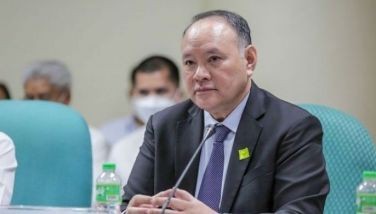Judicial and Bar Council tackles live coverage
MANILA, Philippines - The Judicial and Bar Council (JBC) meets today to approve guidelines for live coverage of the screening of candidates for the position of chief justice.
Jose Mejia, ex-officio JBC member representing academe, said their move to be transparent by approving live media coverage of the oral interview of the nominees was a testament to their mandate of including in the shortlist only the most qualified for the top judicial post.
“Because of the live coverage, we will be more prepared and we will be more discriminate in the manner we ask questions,” he said.
Mejia said members of the council are aware of what is expected of them – to make sure that those to be included in the shortlist to be presented to President Aquino will be of high independence, integrity, competence and moral ascendancy to lead the judiciary.
Several groups and individuals have called on the JBC to be transparent in its selection process and also on its members to ask questions that would test the independence from the Palace of nominees.
Mejia said that media networks will be accredited for the live coverage and will have the discretion to cover all the candidates or only the bets they are interested in.
“The whole idea is to make the process transparent and make live coverage available to the media. It’s hard to second-guess the media but it would be your own lookout which ones you would want to cover. We can’t compel you to cover everyone,” he told reporters.
It means media networks may opt to cover only prominent nominees for the chief justice post and ignore the rest.
Mejia admitted this proposed rule is selective and could be unfair to less prominent nominees, who would not be given equal opportunity to prove their qualification before the public.
Because of this, he said he would propose to fellow JBC members to hold a dialogue with representatives of the media to discuss this issue.
He said media outfits interested in broadcasting the public interviews live would be required to file accreditation with the JBC.
Only one camera provided by the SC public information office would be allowed inside the venue of the oral interviews. It will then be hooked up directly to the cameras of TV networks, which would then transmit the footage to their respective OB vans to be stationed outside the venue.
“This is the best setup we can think of where the process can be more transparent to the public with the least possible distraction,” he explained.
Apart from this, Mejia said the JBC is also set to tackle today the letter of former solicitor general Frank Chavez, a nominee for the top SC post, questioning the composition of their council.
Chavez said the JBC should only have seven members – not eight as it now has – as provided for in the Constitution.
He questioned why the Senate and House of Representatives both have representatives in the council who enjoy one vote each when Article VIII Section 8 (1) of the Constitution states there should only be “a representative of the Congress.”
Mejia revealed that they might also tackle today the question on whether or not the five most senior justices of the high court who were automatically nominated could opt not to face the JBC for oral interview.
Traditionally, the senior magistrates have not faced the council for their nomination for chief justice based on a 2005 ruling, which held that the SC is superior to the JBC so its members cannot be compelled to be subjected to scrutiny of the latter.
But this tradition was broken in 2010 when Renato Corona faced the JBC in oral interview and later was appointed chief justice. He was removed from office by the Senate last May 29 after an impeachment trial for culpable violation of the Constitution and betrayal of public trust through non-declaration of all his cash in the bank in his statement of assets, liabilities and net worth.
As of last Friday, a total of 13 aspirants have accepted their nominations: SC Associate Justices Arturo Brion and Roberto Abad, former UP law dean Raul Pangalangan, De La Salle University law founding dean Jose Manuel Diokno, former Ateneo law dean Cesar Villanueva, elections commissioner Rene Sarmiento, retired Judge Manuel Siayngco Jr., former executive secretary Ronaldo Zamora and lawyers Katrina Legarda, Soledad Cagampang-de Castro, Rafael Morales, Vicente Velasquez and Ferdinand Jose Pijao.
On the other hand, a total of 10 nominees had declined their nomination: SC Associate Justices Mariano del Castillo, Jose Mendoza, Bienvenido Reyes, and Estela Perlas-Bernabe; 2010 presidential candidate Gilberto Teodoro Jr., Integrated Bar of the Philippines national president Roan Libarios, Executive Secretary Paquito Ochoa Jr., Laguna Assistant State Prosecutor Cesar Sasondoncillo, former senator Rene Saguisag and lawyer-businessman Rodolfo Robles.
A nurse named Jocelyn Esquivel and dismissed judge Florentino Floro were the applicants so far who are outside of the legal profession.
The JBC has stopped releasing the names of nominees who have yet to send their conforme after some nominees had expressed concern about the early publication of their names in media reports, believing that the objective in their nomination could be dubious.
The period for filing of application and nomination for the top SC post ends on July 2.
- Latest
- Trending






























